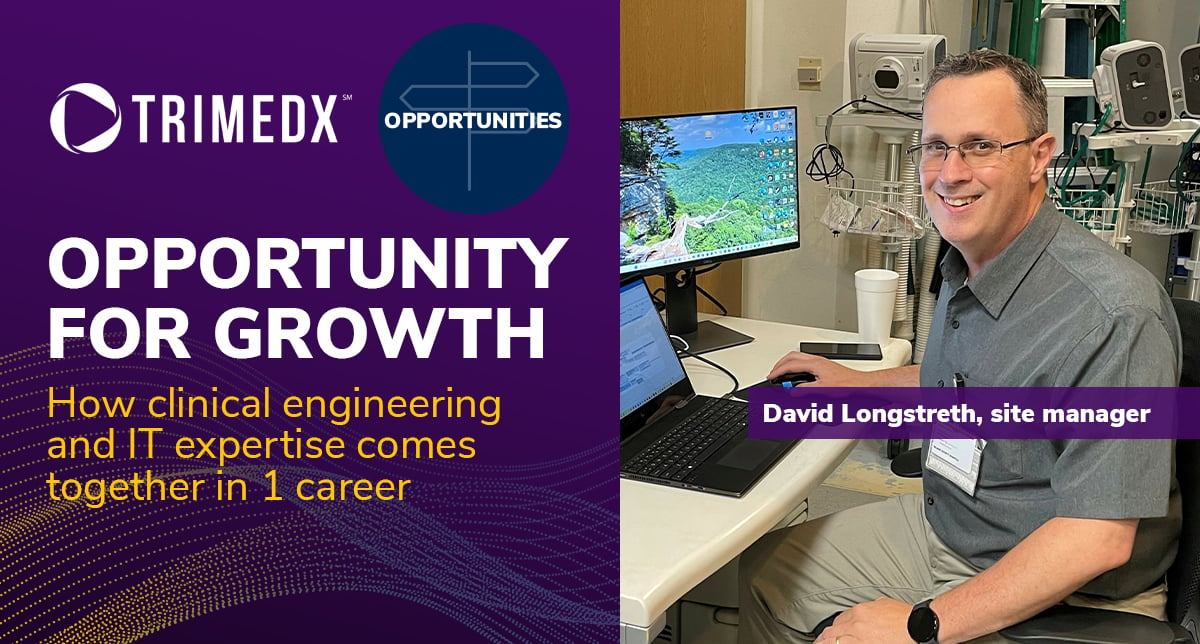Clinical engineering is vital to many aspects of hospital operations and patient care. Over the years, the field has been slowly transforming in a massive way. While some people may know clinical engineering as wrench-turning and preventative maintenance, it has also evolved to include behind-the-scenes technology maintenance.
Clinical Engineering Information Technology (CE IT) has been growing in popularity since the late 1990s, and the TRIMEDX team has been an integral part of that expansion.
We recently met with members of the TRIMEDX CE IT team to learn more about their career specialty and their advice to those who might have an interest in pursuing a similar path.
Q: What does a day in the life of a CE IT pro look like?
David Longstreth: A lot of cyber patching happens every day. It may seem mundane to some, but it is a necessary and important part of the job. It’s also an opportunity to work closely with other technicians to triage technology issues and supporting escalated needs. We also work closely with customers on day-to-day needs while conducting in-depth reviews of our disaster recovery (DR) plans.
Mike Carboni: We spend a lot of time working on asset-tracking systems, patient monitoring, and other related systems that need to be supported technically. Another large part of the job is supporting technicians in troubleshooting system and network issues.
Q: What advice would you give someone interested in pursuing a career in CE IT?
David Longstreth: First, work on the stress systems, including EKG, Cath lab, and any other medical device that is a computer. Familiarize yourself with patient monitoring too. Education is another component. =You can lean on udemy.com and look for promotions on training opportunities focused on technical skills. You don't have to certify for everything as long as you complete the learnings and understand how to apply the material. One certification that may be impactful is “A+”, but it does depend on individual circumstances.
James Bryan: It’s important to have an interest in taking a holistic view and learning how all the pieces and parts work. For example, not just knowing to plug something in, but understanding why we do it. Biomed experience is also important and positions you well. Certifications may be helpful to pursue, but if you’re very interested, I recommend researching the space and learning all you can from a variety of resources. Education is also a good baseline to enter the field. A four-year degree is not always critical, but a healthy mix of education, training, certifications, and experience is the key.
Mike Carboni: You really need a well-rounded IT background: networking, server administration, application administration, and web administration. Also, to be willing to work in a variety of IT fields rather than specializing in one singular area. I recommend, at minimum, a two-year IT degree with an emphasis in networking.
Q: What makes someone successful in CE IT?
James Bryan: CE IT is the intersection of interdisciplinary technical focuses, so the first thing is to be willing to dig in and find the answer. We often get the hard problems. Those problems aren't easy to solve at first pass, so someone must enjoy taking an analytical approach while knowing the answer is not just five minutes away. This isn't the only path, but is one that has proven successful. Learning more about computers is key. I view it as a way for clinical engineering to help hospitals bridge the gap between IT and CE.
Mike Carboni: Mentorship is necessary for those learning the job, interested in learning the job, and those who know the job. Mentorships should always be offered and if you are in a CE IT role, you should always be willing to mentor.
James Bryan: Mentorship is critical. For our team, it is imperative new additions shadow and learn from an experienced CE IT professional during the first three to four months. Understanding general troubleshooting, downloading patches, engaging with the techs and hospital staff are all vital learnings from mentorship.
Q: What do you want others to know about this field?
Mike Carboni: It is the best IT job you will ever have. You will constantly learn and grow in this field. It can be challenging at times, but it is a rewarding and stable job as long as you lean on your support system of biomedical technicians, vendors, other IT professionals, and hospital IT professionals.
James Bryan: If you have a willingness to learn CE IT and get into a variety of systems, it really pays off.
